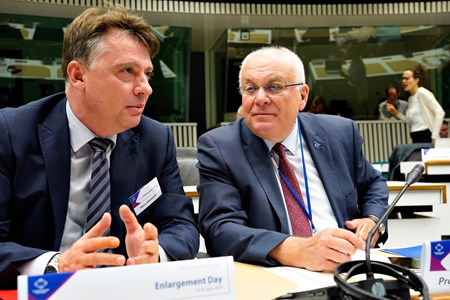
The EU Enlargement Day organized by the European Committee of Regions, as its annual flagship event on EU enlargement policy, took place on 18-19 June, 2019 in Brussels, Belgium. NALAS has been participating in the Enlargement Day since 2016 and its continuous and active presence, both in the Joint Consultative Committee and Working Group meetings as well as in the plenary, demonstrates the close working relationship with the European Committee of the Regions’ (CoR) and its CIVEX Commission (Commission for Citizenship, Governance, Institutional and External Affairs).
The Enlargement Day 2019 took place for the 5th time focusing, since its initiation in 2015, on the growing realisation that a country joining the EU needs to prepare, not just its central government and administration, but also the local and regional level – as the level that eventually will implement more than 2/3 much of the EU legislation by adapting its principles and standards.
Mr. Shilegov, in his function as Mayor of Skopje and President of NALAS and ZELS, initiated his key note address referring to the development process in Poland during and after the accession process. The Polish experience was characterized as a role model for the WB6 worth be emulated and learned from due to its motivating success to improve governance and boosting socio-economic development by actively involving the local government level. Interesting to note is that the contribution of local and regional authorities as government tiers was embedded at the same time in an ongoing decentralization process.
The NALAS President stressed that the Forum of Cities and Regions in Rzeszow, a side event of Poznan 2019 under the Polish Presidency of the Berlin process, realised two weeks ago, impressively demonstrated the fact how EU funding support can improve governance leading to socio-economic transformation when local governments are actively involved in its implementation.
In contrast, in the Western Balkans’, local governments face a disruption of the decentralisation process, are underfunded with limited fiscal autonomy and not effectively integrated as strategic partners in the EU accession process. In this context, it becomes evident that Western Balkans’ local governments are currently not in a position to play a transformative role as their Polish counterparts did.
Mr. Shilegov then referred to the findings of two important recent regional NALAS surveys, the internal report of the Regional Decentralisation Observatory, and the 7th Fiscal Decentralisation Report for SEE, in order to provide evidence-based data. This data underlines the fact that even though there is a solid political, legal and administrative decentralisation process in place, there is a clear lack of adequate Fiscal & Financial Autonomy. In other words, local governments in general have insufficient financial resources to effectively fulfil their obligations to provide quality public services to its citizen and to promote sustainable local socio-economic development. In general terms, EU funding has eased some of the pressure by providing soft infrastructure support, but has not yet been able to alleviate the capital investment constraints local governments face. These limitations are further broadened by an increased level of control and interference from higher levels of government in local priorities and affairs, especially via block grants.
In such a context, the NALAS President emphasised that effective intergovernmental dialogue and continuous and ongoing cooperation with the respective national governments are a MUST to find solutions for improved governance. This requirement goes in hand with setting the right vision and adopt adequate long-term policies for local authorities.
The Mayor of Skopje shared with the participants a number of NALAS recommendations that can help facilitate improved governance via EU funding leading to local socio-economic development in the region such as:
- The involvement of NALAS in cooperation with RCC to implement the Regional Economic Area
- Learning from the shortcomings of IPA2 by setting up IPA3
- To reinstate the Local Administrative Facility (LAF) or alternative as part of the TAIEX tool kit
- To extend the Covenant of Mayors to the WB6 supporting the localizing of SDGs
- The simplification of EU rules for local governments as beneficiaries
In addition, Mr. Shilegov also presented at the Joint Consultative Committee in the panel on EU-North Macedonia relations: Recent developments and impact on sub-national authorities.